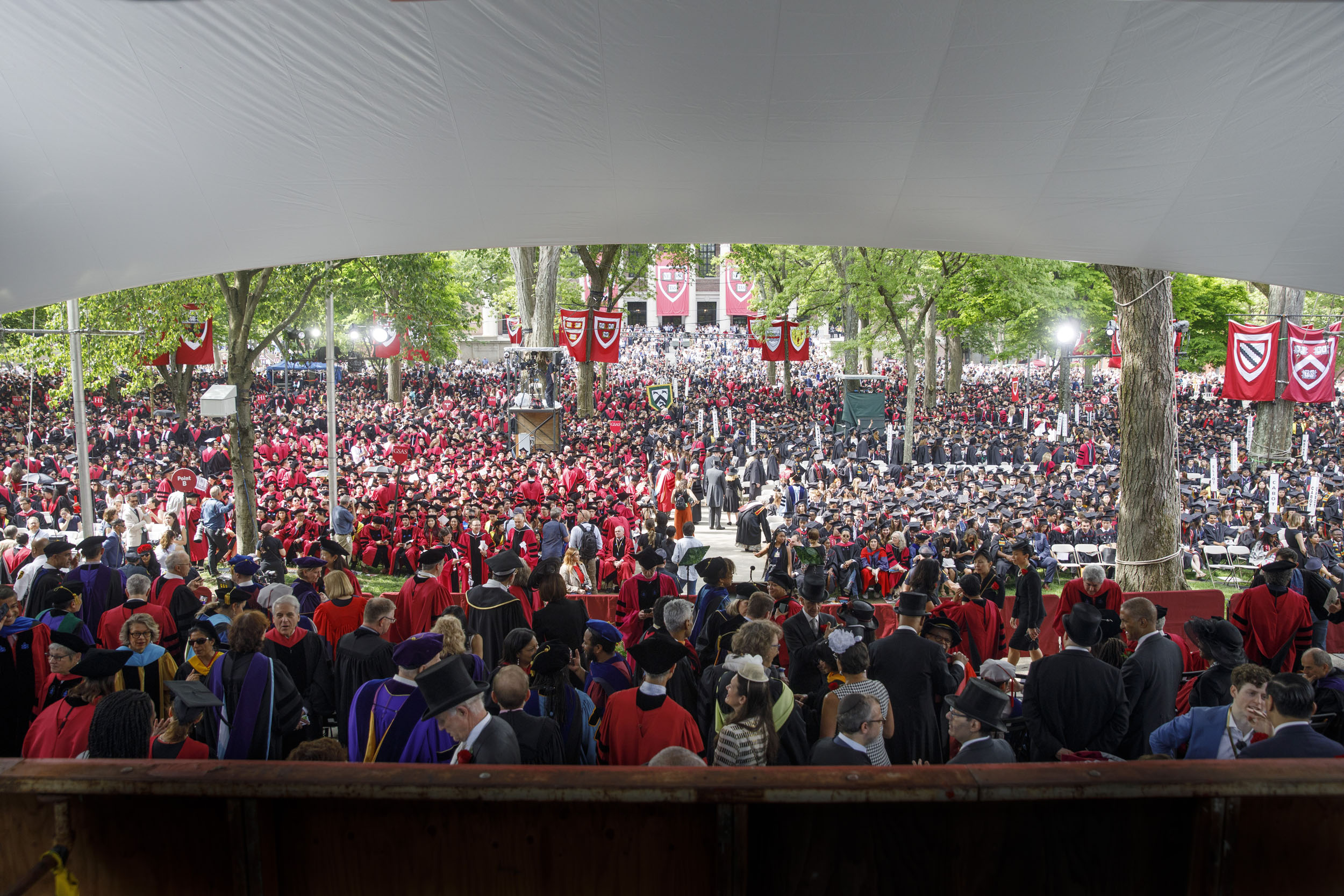
Kris Snibbe/Harvard Staff Photographer
Day to remember
One journey behind them, grads pause to reflect before starting the next
Part of the Commencement 2024 series
A collection of stories covering Harvard University’s 373rd Commencement.
Thousands of graduates gathered with family, classmates, and faculty in Harvard Yard to mark the University’s 373rd Commencement. In conversations with Gazette writers, they put their emotions, and dreams, into words.
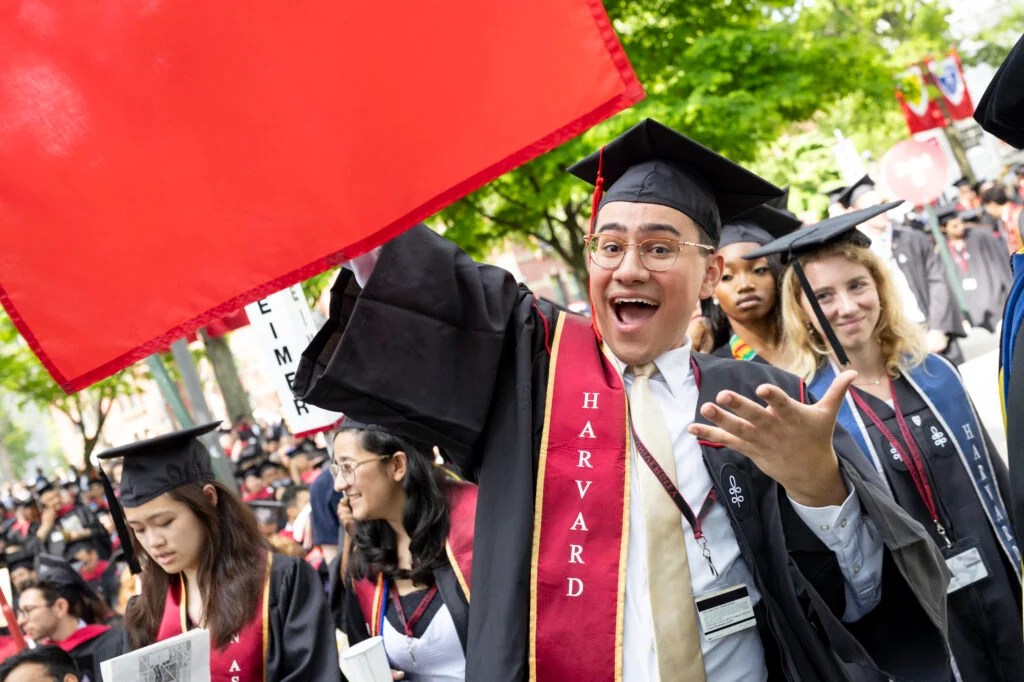
Michael Mantello ’24 holds the Pforzheimer House shield.
Niles Singer/Harvard Staff Photographer
Finding the right guide
Maria Gonzalez said a key to finding success as a master’s candidate in management from the Harvard Extension School came down to people. Actually, one person in particular.
“The key to really having a great experience here is to be best friends with your adviser,” said a smiling Gonzalez, who was rushing through the crowd in the Yard. “They will guide you the entire way through and make it as easy as possible for you to succeed.”
Gonzalez, who is from San Juan, Puerto Rico, proudly displayed her LatinX affinity scarf, and detailed the meaningful ceremony she attended with others from the community earlier in the week.
She began her coursework at the University of Puerto Rico, then transferred to the Extension School to complete the joint A.L.B.-A.L.M. program. Being able to go back and forth between Cambridge and home gave her “the best of both worlds” as she balanced her career with pursuing her degree.
As the current CEO of IKInnovations, a renewable-energy semiconductor manufacturer, Gonzalez has her hands full licensing a patent for the company. But she admits she’s looking forward to slowing down soon and seeing what her future has in store.
“Once that’s done, maybe I’ll take a really nice, long vacation,” she said. “And then see where Harvard takes me from there.”
Being nimble as dancer, nontraditional student
Genevieve Waldorf has had to be nimble and flexible throughout her undergraduate career, forging a path for herself on a nontraditional trajectory. But being agile comes naturally to her as a professional ballet dancer.
Waldorf grew up in Los Angeles, but now lives in Seattle and is a member of the Pacific Northwest Ballet. She began at Harvard College in 2015 but took some time off after being appointed apprentice to the company in 2018, and then to the corps de ballet. During the pandemic, she completed a year of school online and eventually found a rhythm for balancing dance with her degree.
“I danced during my season and then came here during my summers,” she said. “It’s definitely challenging not consistently doing school all the time.”
Reflecting on her journey, she said she often had to relearn material during her long breaks. After nearly a decade, she’s excited to graduate with a degree in applied math with a focus on government and a secondary in computer science.
She plans to dance for a while longer but is considering a career in tech or data analysis when that chapter of her life ends. And she said it wouldn’t have been possible without the people who invested in her.
“I’m just really grateful for a lot of the people who helped me with my journey here. It was complicated and unique, and they really kept me motivated and found new pathways for me to make sure that I could earn my degree,” she said.
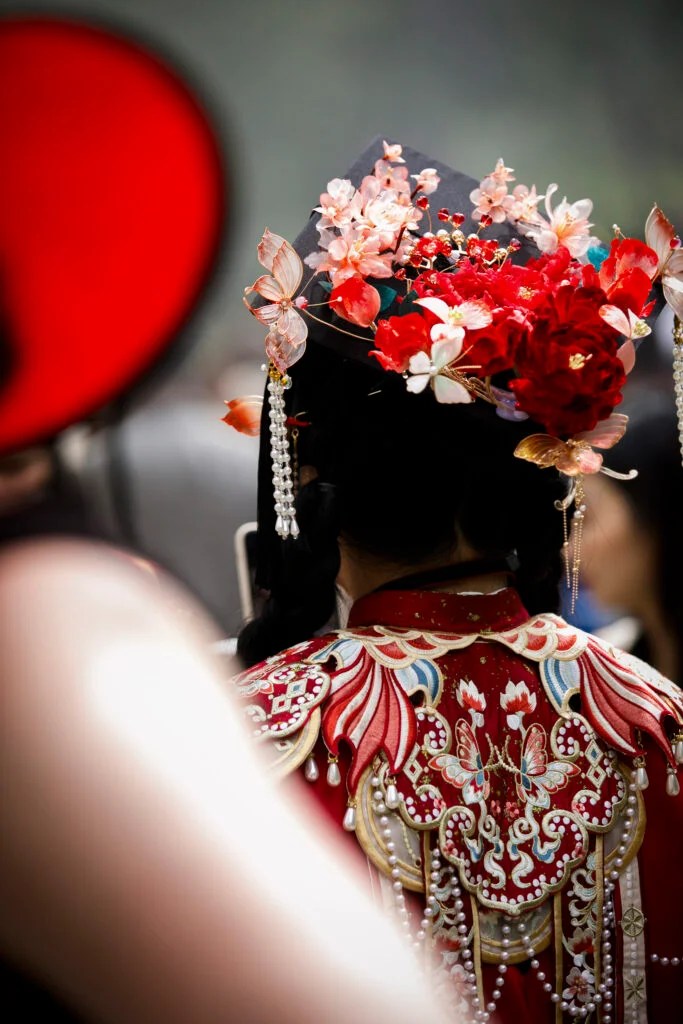
A lavishly decorated mortarboard.
Stephanie Mitchell/Harvard Staff Photographer
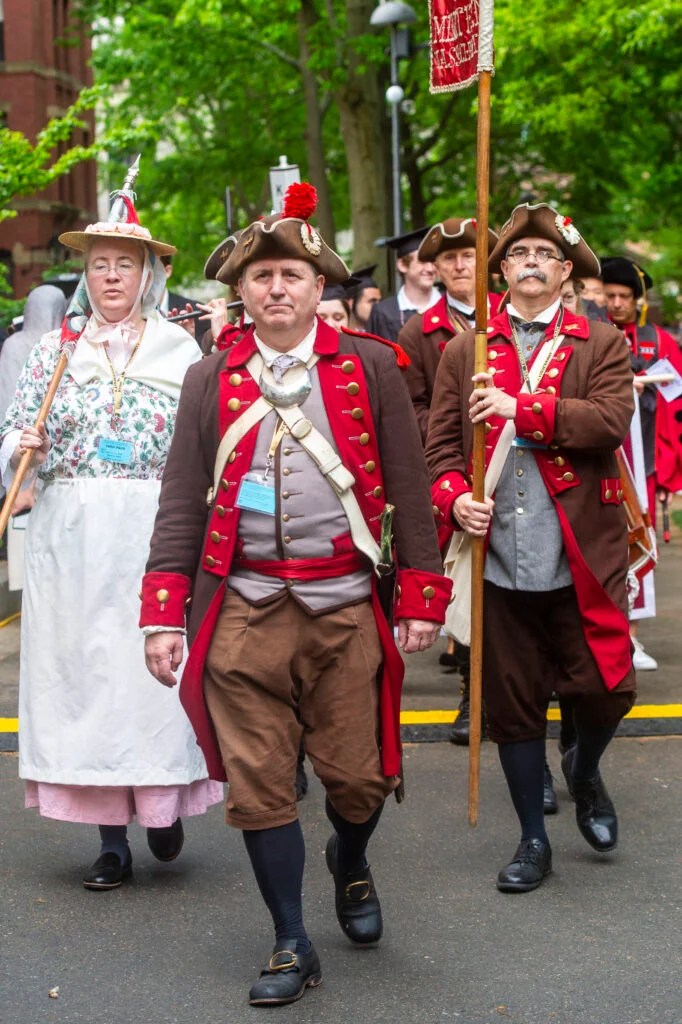
The Bedford Minutemen join the festivities.
Jon Chase/Harvard Staff Photographer
Writing her next chapter
Maggie Kern chatted happily with her mom, husband, daughter, and friends in the Yard, relaxing on the sunny Commencement morning before she’d have to make her way back to her seat for the festivities.
“We’ve all bonded a lot,” she said, speaking of her classmates who also pursued master’s degrees in creative writing and literature at the Harvard Extension School. “It’s just wonderful to be here and see everyone coming from everywhere.”
Kern and her family made the trek to Cambridge from their home in Bend, Oregon. The program took 2½ years to complete, remote except for a three-week-long summer residency program last July.
Coming out of the program, Kern is excited to start writing novels, a process she began in school. She feels prepared not just for the process of writing but also for the world of publishing that follows.
“Now we’re being launched out to go to the wild and figure out how to get that done,” she said.
Her daughter, Zoe, who is pursuing a law degree at Georgetown, said she’s incredibly proud of her mother and all that she’s accomplished.
“It’s pretty amazing … this was her ‘empty nest’ project, which, she’s just an overachiever,” she said with a laugh. She loves that she and her mom were in school at the same time and that they can read and edit each other’s work.
Kerns and her family were planning to attending all the ceremonial events, then explore the city and enjoy a family dinner at Barcelona Wine Bar. All in all, a wonderful day.
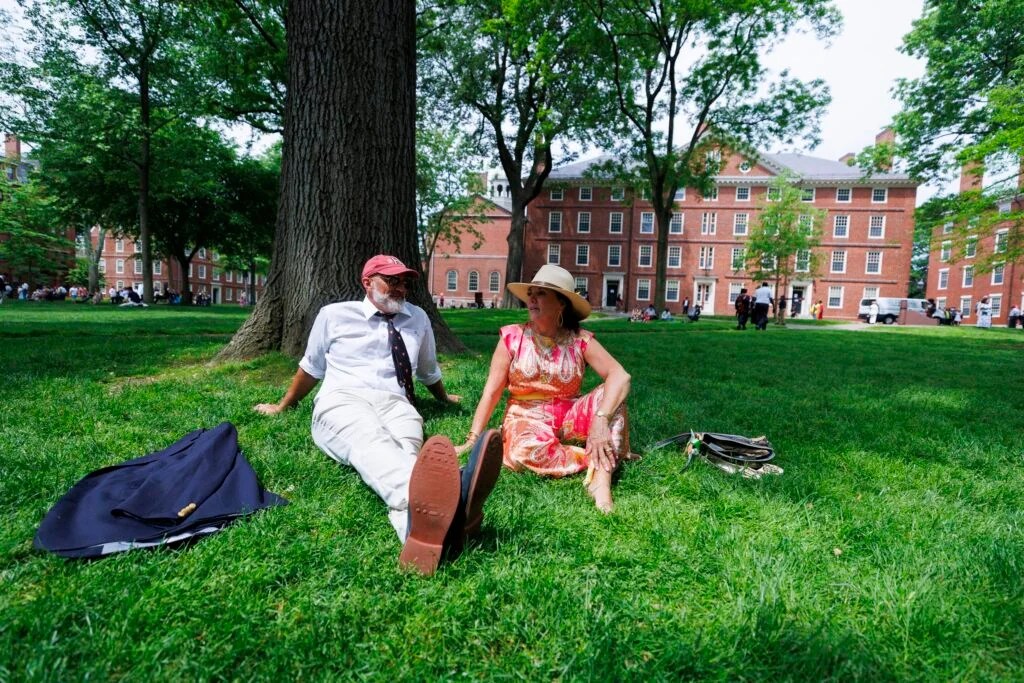
Sam Zimmerman ’92 and Suzanne Zimmerman relax in Harvard Yard.
Stephanie Mitchell/Harvard Staff Photographer
Law School first for her tribe, she vows not to be the last
Samantha Maltais, J.D. ’24 — the first member of the Aquinnah Wampanoag tribe to enroll in and graduate from Harvard Law School — was overcome with joy and gratitude on Thursday.
“Our community has been for so long in the shadow of Harvard University,” said Maltais, calling her achievement “a reminder of the obligations that I feel toward my community and Indian country more broadly.”
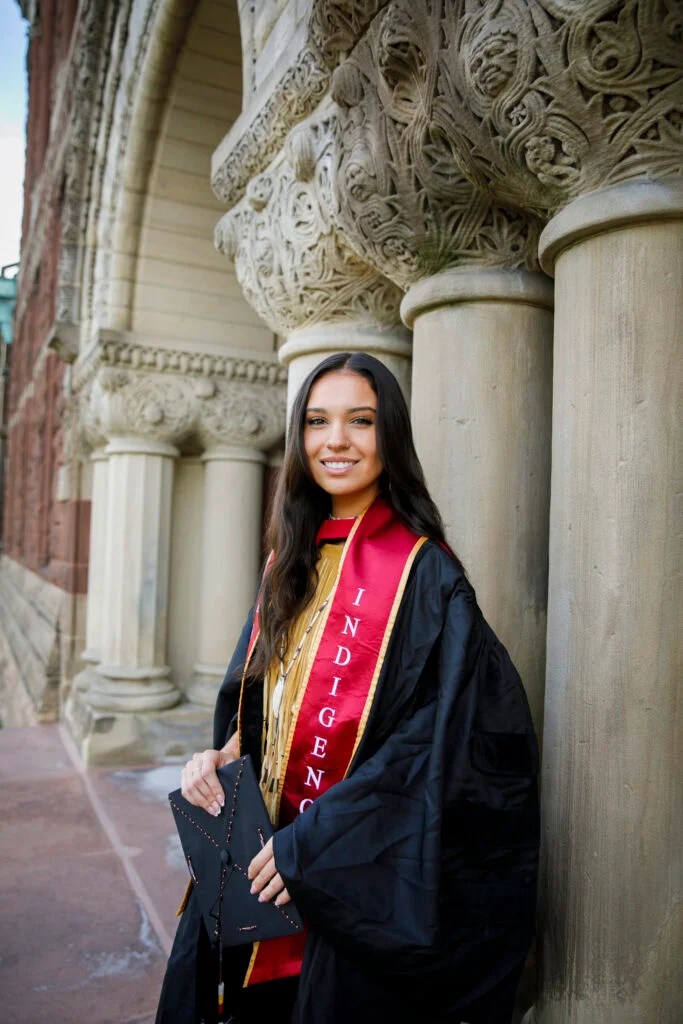
Samantha Maltais.
Stephanie Mitchell/Harvard Staff Photographer
The Wampanoag were the original people of the island of Noepe (Martha’s Vineyard), and in 1665, Caleb Cheeshahteaumuck, a member of the Wampanoag, graduated from Harvard. Cheeshahteaumuck was the first Native American student at Harvard, which according to its Charter of 1650 was committed to “educate the English and Indian youth of this country in knowledge and godliness.”
Maltais grew up watching both her grandmother and mother work to protect their tribal community, which is located on the western side of Martha’s Vineyard. Her grandmother helped the tribe gain federal recognition. Her mother is its chairperson. Their examples inspired Maltais to pursue a law degree.
“A lot of the things that drove me to pursue a career in the law was watching the injustice faced by tribal communities and seeing my mother and other tribal leaders advocate and navigate the maze of injustice that is federal Indian law,” said Maltais, who was dressed in full regalia to honor her heritage.
At the Law School, Maltais deepened her interest in environmental law, a field closely related to Indigenous rights. As part of her coursework with the Environmental Law and Policy Clinic, she traveled to New Zealand and Australia to do research on Indigenous self-determination rights and environmental issues.
After graduation, Maltais will move to San Francisco to work as a clerk for the Ninth Circuit Court of Appeals. She hopes that other Native American students will follow in her steps because their presence in the classroom, she said, fosters a better understanding of Native people and the challenges they face, the rights afforded to tribal nations, and the distinctive relationship between the U.S. government and federally recognized Indian tribes.
“Being the first is always exciting,” said Maltais, “but it’s a responsibility to make sure that you’re not the last and keep that ladder down for folks, and especially other Native youth who have these hopes and dreams of attending Harvard Law School. It’s my hope that we’ll soon get to the point in time where it’s not the first or second, but it’s the 20th and 50th down the line.”
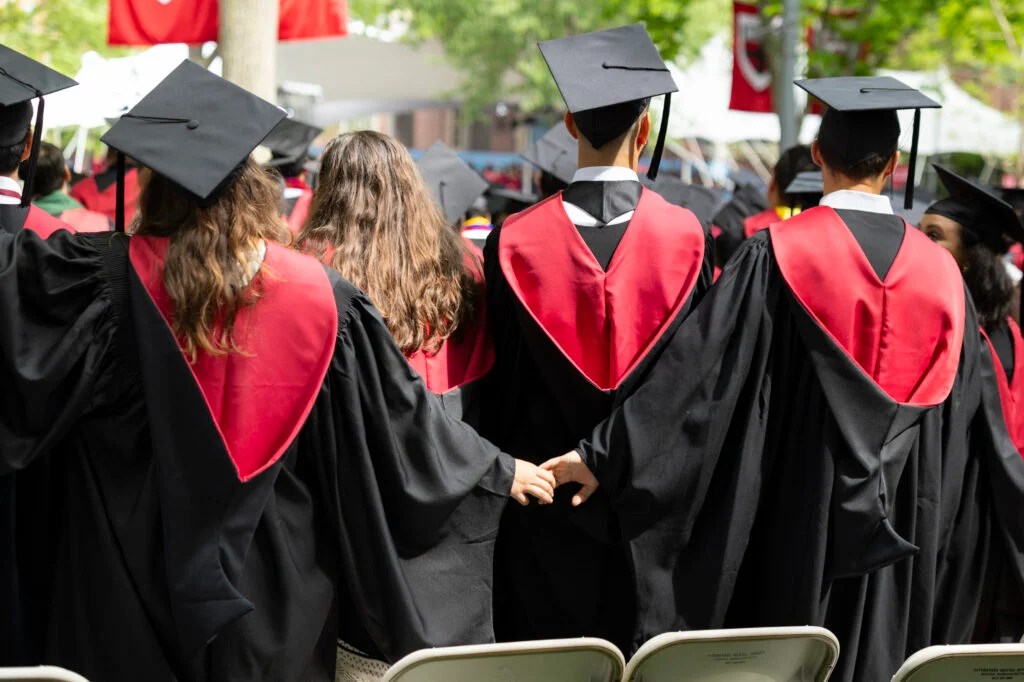
Two graduates hold hands during the prayer.
Niles Singer/Harvard Staff Photographer
Helping his business take off
Jeremy Hung, an entrepreneur from Jiangsu, a province near Shanghai, China, was taking selfies in the Yard before Commencement exercises.
The graduate, who received a master’s degree in management from Harvard Extension School, was elated. The School had allowed him to take online classes as he was running his budding international travel agency from his hometown. He also took some classes in person, traveling between China and the U.S.
Running a small business in China is not easy, said Hung, who received his bachelor’s degree from a Chinese university. He registered at the Extension School to learn management skills to take his travel agency, which caters to Chinese international students, to the next level. He said he learned much more than that.
“Like many Chinese students, we go outside of China to see the world because we meet people from different ages, cultures, and walks of life,” said Hung. “I learned a lot from my classmates. Some were already very experienced, and others were very successful entrepreneurs. I learned not only work skills such as how to be a good entrepreneur, I also learned about different cultures, something I cannot learn in China.”
To celebrate his graduation, Hung will travel to New York City with his parents over the weekend. But he is already planning to take more classes at the Extension School soon.
“It gives people like me the chance to further our education as we run our businesses or do our work,” said Hung. “There are lots of choices.”
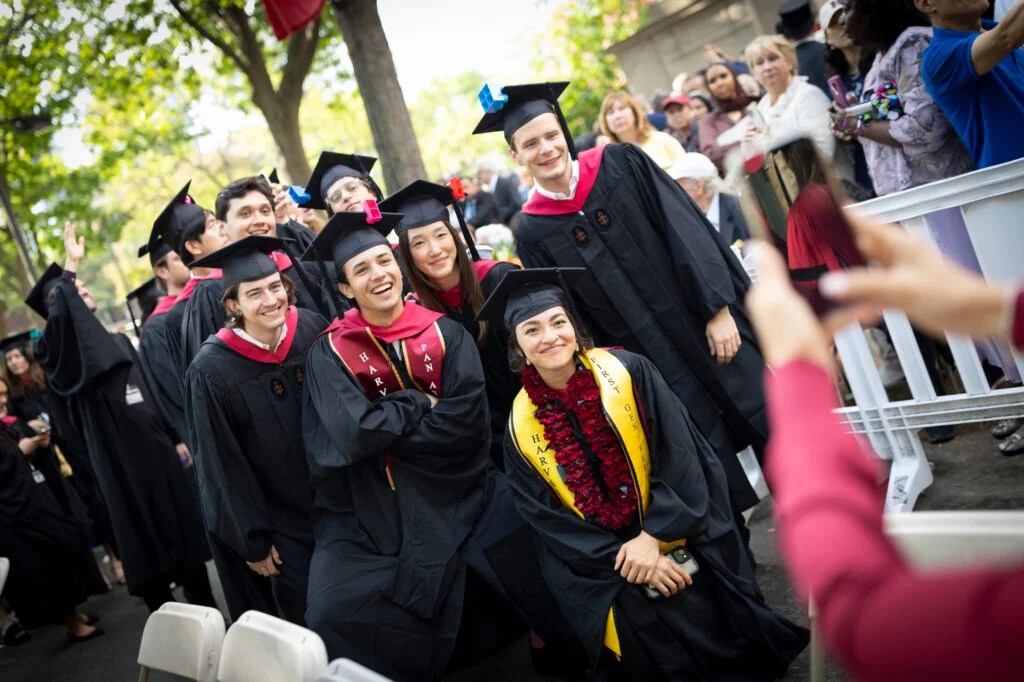
Students stop to pose for a photo while processing into Tercentenary Theatre.
Niles Singer/Harvard Staff Photographer
Walking with old, new friends
Graduation was a long time coming for Jordan Alexandra Sanchez, a math concentrator with a secondary in psychology. Originally a member of the Class of 2023, Sanchez took time off during COVID but came back to join the Class of 2024.
“I was a first-year who was kicked off campus during the pandemic,” said Sanchez, who wore her LatinX graduation stole on top of her gown as she stood in the Yard waiting for the ceremony to start.
“A good number of my friends graduated last year, but a decent amount of us stayed in to walk together this year. Being able to befriend a lot of the members of the Class of 2024 while also having some of my 2023 friends is special.”
A climate activist in high school, Sanchez remembers when she was accepted to Harvard. “My admissions officer wrote me a note saying that they really valued my student activism,” said Sanchez, who also expressed sadness over the 13 seniors who were prevented from receiving their degrees after their participation in the pro-Palestine encampment in Harvard Yard.
“Harvard is built on this idea of being a community leader in your neighborhood, in your city, in your state, but also the world,” said Sanchez. “What kind of world-changer doesn’t shake things up or break a couple of rules sometimes? As Harvard students, we’re supposed to be leaders, not only of our campus, but we’re supposed to grow up and become the CEOs, lawyers, Supreme Court justices. These are the moments in which we define ourselves.”
Moving House
The rain that hit Cambridge missed Commencement but had an impact on Adams House’s diploma ceremony, forcing a move from the House’s courtyard to the Malkin Athletic Center’s fourth-floor gymnasium.
Economics concentrator Shang Wang said that since the class missed its high school graduation because of the pandemic, it was somehow fitting that students were awarded degrees in a setting suited to a high school ceremony.
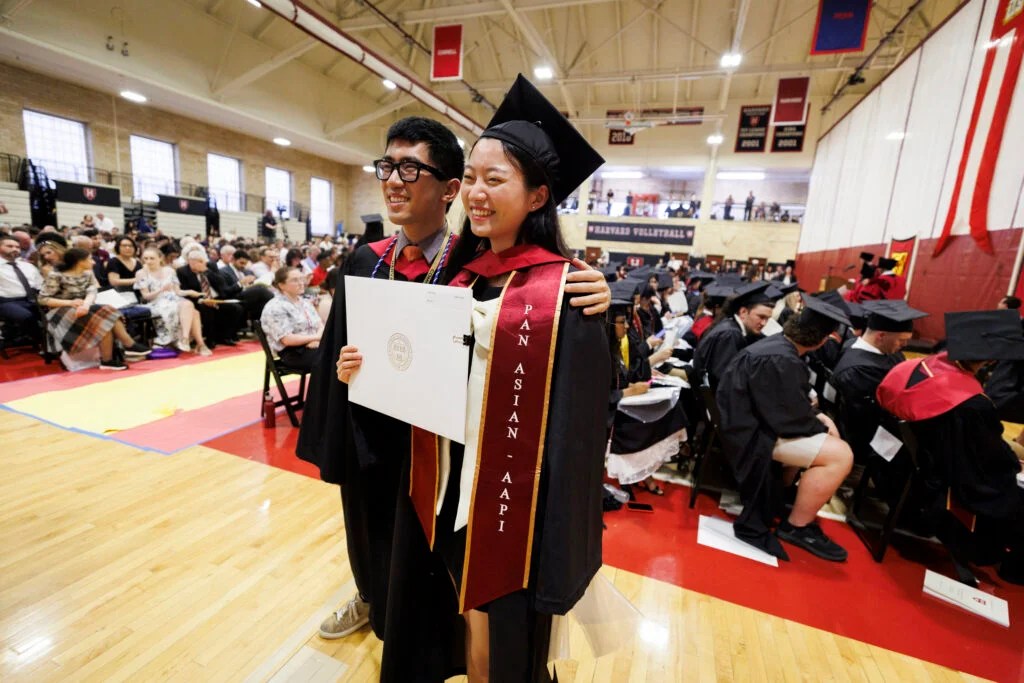
Shang Wang (right) shares the proud moment with her former teaching fellow Di Ai.
Stephanie Mitchell/Harvard Staff Photographer
Wang and other students highlighted the return to campus after a year of online classes as a difficult turning point. Adjusting to face-to-face contact with so many people was overwhelming, she said.
“At the beginning I was just quite nervous, quite shy, especially in Adams dining hall,” she said. “We were in a new environment. We didn’t know any of the upper classmen. We didn’t even really know the people in my class, actually.” Teaching staff and tutors “helped me open up,” she said.
Isabella Meyer, an English and music concentrator, described Commencement as a “powerful” moment, full of mixed feelings. “It was an extremely happy, momentous, celebratory day for some and a deeply tragic, conflicted day for others,” she said.
She was happy to share the event with her family, who flew from Bremerton, Washington, to watch her graduate.
For Rothsaida Sylvaince of Everett, Massachusetts, the short drive from her hometown meant she had lots of support as she wrapped up four years at Harvard amid cheers in the MAC gym.
“It’s been a very long journey and I think I’m really excited,” she said.
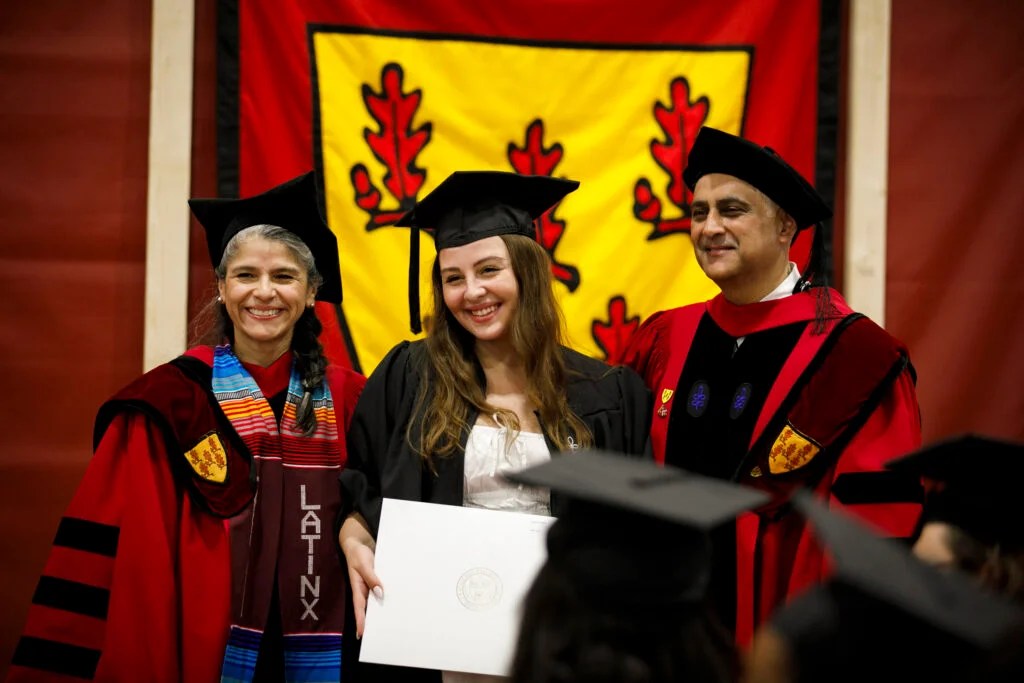
Isabella Meyer ’24 (center) with Adams House Faculty Deans Mercedes Becerra and Salmaan Keshavjee.
Stephanie Mitchell/Harvard Staff Photographer
Singing praises of accomplished niece
Hanan Zehry received a master’s in healthcare quality and safety from Harvard Medical School on Thursday to complement her doctorate in health sciences from Hiroshima University and master’s in nursing from Suez Canal University. She is not, however, one to toot her own horn.
Her uncle, on the other hand, was more than willing to sing his niece’s praises as the pair walked across Harvard Yard.
“I learn from her — the resilience, the commitment, the flexibility, and how to maneuver in life,” said Essam Hegazy, an assistant professor of English language and cultural criticism at Suez Canal University.
Originally from Egypt, Hegazy said in their home country, women are sometimes discouraged from pursuing their ambitions.
“She’s a smart young lady … and she’s independent. She’s the one who paid for tuition. She’s a working woman, full-time studying, and she fought a society in order to come here,” he noted.
Hegazy said that perhaps the thing that he admires most about his niece, who also spent a year as a research fellow at Spaulding Rehabilitation Hospital before completing her Ph.D., is her courage.
“Society says that now that you are grown, you need to get married. And why do you do that? You have a Ph.D. from Hiroshima. That’s too much money to spend on education. It’s not worth it.
“This is the fighter personality in her,” he said.
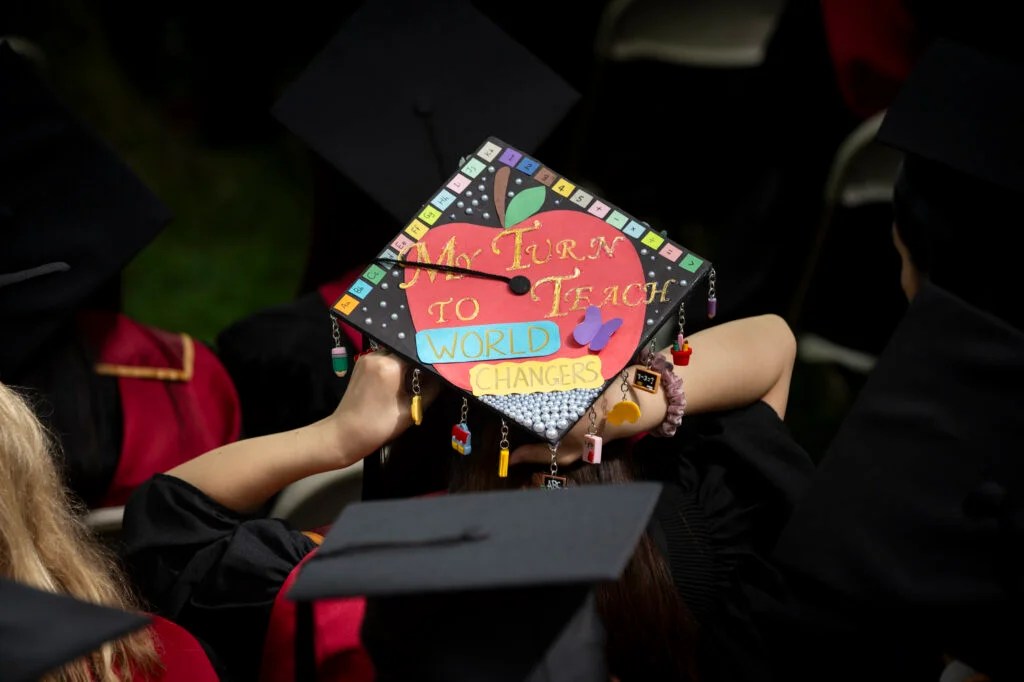
A mortarboard spells it out: “My turn to teach.”
Niles Singer/Harvard Staff Photographer
From engineer to entrepreneur
Siddhant Pardeshi wants to help small-business owners make their dreams come true. Immediately following his conferral of dual master’s degrees from Harvard’s John A. Paulson School of Engineering and Applied Sciences and Harvard Business School, Pardeshi said he was excited to get to work on the startup he founded with co-graduate Brian Elliot.
“It’s hard to just have one day to digest everything we’ve gone through for all these years. But I feel proud to be graduating finally, and I feel even more responsible for what it entails now that the degrees have been conferred, and the lens of the world now changes from a student to an alumnus, and everything you do has much more weight,” Pardeshi said.
Pardeshi was formerly a software architect with the tech company NVIDIA and had planned to return there after grad school. But that was before he landed on the idea for his AI company Blitzy, a web-based service that helps small businesses streamline the creation of software, including easy-to-use apps.
“It’s about creating software using generative AI and helping businesses afford to hire top talent and letting them benefit from high-quality software done right and at the right price,” he said. “I’m happy that starting a founder’s journey and graduating have coincided.”
Born and raised in India, Pardeshi said he has long been planning his permanent move to the U.S. and will be staying in Boston to start his business.
“NVIDIA transferred me to the U.S. in 2020, but I could not move because of the travel ban. And then I came here thinking that I will go back to NVIDIA after completing my two years,” he said. “But then I’m in the M.S./M.B.A. program and the program is designed to train entrepreneurs. I got converted to be an entrepreneur.”
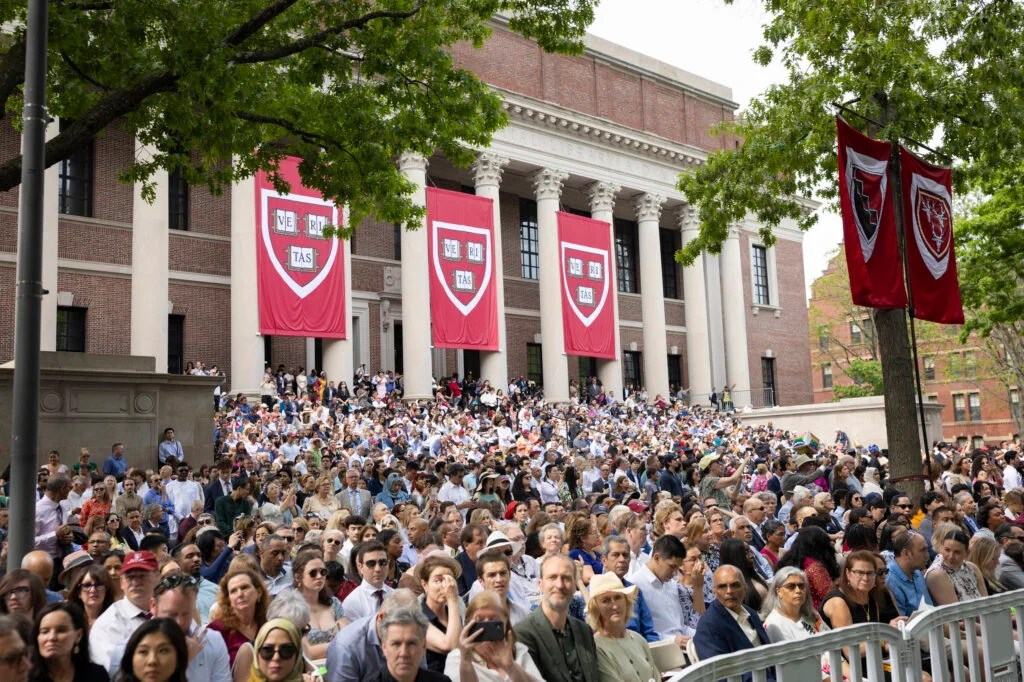
Spectators fill the steps of Widener Library in Tercentenary Theatre.
Niles Singer/Harvard Staff Photographer
Becoming a citizen of the world
Egbe Enobakhare had experience treating patients suffering from sexual and gender-based violence in her home country of Nigeria and decided Harvard could help her make a greater impact.
But in her time earning her master’s of medical sciences in global health delivery at Harvard Medical School, part of Enobakhare’s focus shifted to delivering healthcare to communities in need across the globe.
“I want to do a lot of advocacy for persons suffering physical and sexual violence,” she said. “But I also want to do a lot of advocacy for health equity worldwide. I believe that wherever you are, no matter what part of the world you are in, equitable health care is not available to everybody.”
In Nigeria, Enobakhare served as a coordinator for the Edo State government Sexual Assault Referral Center as well as working in family medicine in the state capital of Benin City. There, she provided medical care to patients, helped represent them in legal matters, and “advocated for policy changes in relation to violence.”
Enobakhare said her time in graduate school broadened her view of herself as well as her work.
“I thought that I was a citizen of Nigeria. Now, I think I’m a citizen of the world. I’m a global citizen,” she said.
Enobakhare’s sister, brother, sister-in-law, and nephew traveled from Nigeria to see her graduate. She said she was grateful for her time at Harvard.
“My fellow students, I owe them a lot,” she said. “A lot of gratitude for helping me imbibe the Harvard culture of diversity and inclusiveness. And the faculty, I owe them a lot. For the knowledge they’ve imbued in me is not just about the knowledge in the academic work, but in the whole essence of life. And I’m looking forward to changing things in the world.”
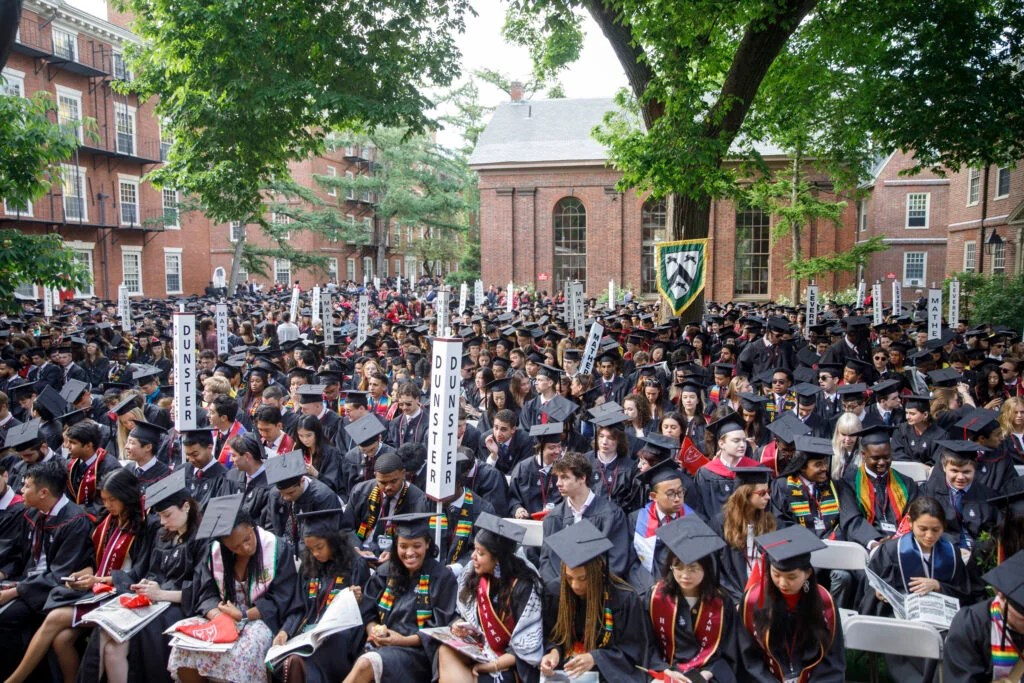
The senior Valediction in Harvard Yard between Phillips Brooks House and Holden Chapel.
Kris Snibbe/Harvard Staff Photographer
Heeding a voice from the past
“The true Harvard is the invisible Harvard.”
Philosopher and psychologist William James spoke these words at a Harvard Commencement dinner more than 100 years ago. On Thursday, they were repeated by Stephanie Paulsell, Susan Shallcross Swartz Professor of the Practice of Christian Studies at the Divinity School and an outgoing faculty dean at Eliot House.
Paulsell was the featured speaker at this year’s Valediction, an early morning ceremony set on the courtyard between Phillips Brooks House and Holden Chapel. The event invites graduates to look back on their years at the College while bidding the community a proper farewell.
Paulsell used the occasion to invoke James’ “invisible Harvard.” James, who taught one of the University’s first psychology courses in 1875, reflected upon a place of “independent thinking and undisciplinable thinkers,” where students stay up late to pursue fresh ideas or wake up early to solve equations. “The university most worthy of rational admiration is that one in which your lonely thinker can feel himself least lonely, most positively furthered, and most richly fed,” he said.
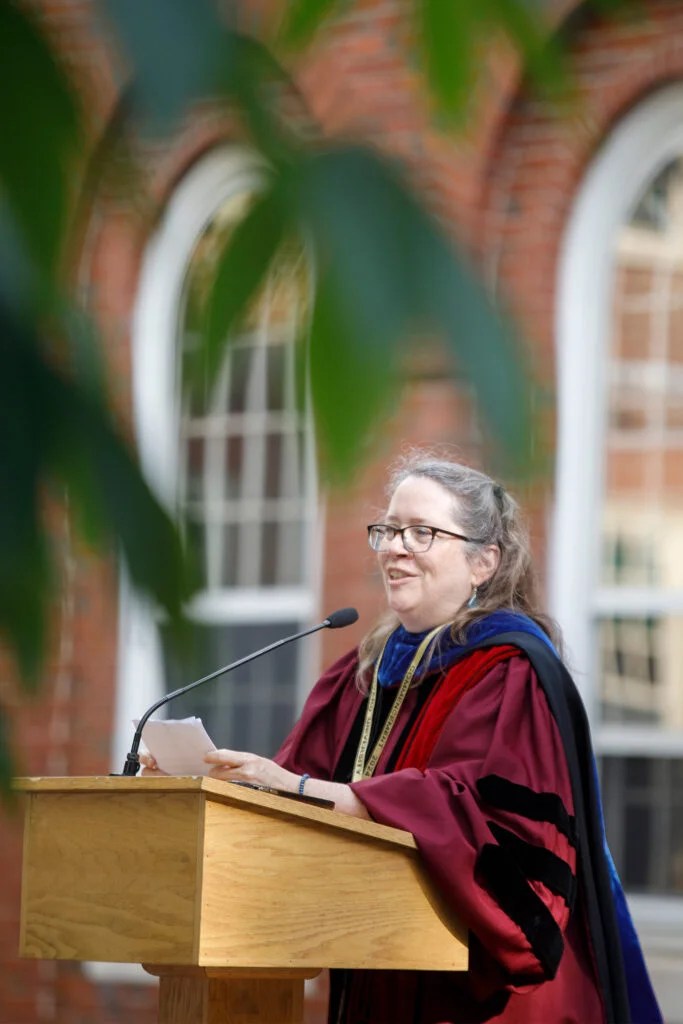
Stephanie Paulsell.
Kris Snibbe/Harvard Staff Photographer
Students arrived in neat procession for the outdoor ceremony, blowing bubbles and waving to faculty members. Rakesh Khurana, Danoff Dean of Harvard College, poked his head from an upper-floor window of Phillips Brooks House, iPhone camera pointed squarely toward the Class of ’24.
“This event is only 15 minutes long, but it is based on the College’s oldest traditions,” Khurana said from the podium a few minutes later.
Paulsell taught at the Divinity School for 20 years before arriving at Eliot House. A friend from the English department helped orient her by sharing James’ 1903 lecture, which was titled “The True Harvard.”
“I don’t want to pretend that there’s no tension around this Commencement,” Paulsell said after reading a few excerpts. “We all know there is. But during a year where Harvard has been hyper-visible, I hope you have found some joy and some ease in James’ invisible Harvard.”
In her speech, Paulsell also offered an expanded definition of “The True Harvard.”
“What Harvard means in the world will depend upon the way you live your life, the way you treat other people — the communities into which you pour your creativity, your brilliance, and your skill,” she said. “The families you nurture. The art you make. The institutions you build. The work to which you devote your best energy. All the ways you find to help others feel less lonely, positively furthered, and richly fed.”




